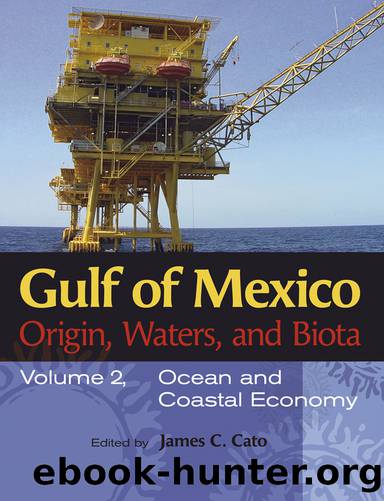Gulf of Mexico Origin, Waters, and Biota by Cato James C.;

Author:Cato, James C.; [Cato, James C.]
Language: eng
Format: epub
Publisher: Texas A&M University Press
Published: 2009-08-15T00:00:00+00:00
4
The Changing Coastal and Ocean Economies of the United States Gulf of Mexico
JUDITH T. KILDOW, CHARLES S. COLGAN, AND LINWOOD PENDLETON
Introduction
A comprehensive strategy is needed to protect and nurture the Gulf of Mexicoâs riches. Public focusâand that of the government and academicsâhas been largely locked on the devastation from the 2005 hurricanes. But stresses on the rich natural resources of this special area have been intensifying for many years. These stresses have been felt especially in the degradation and shrinkage of wetlands and the decline of fisheries. Declining water quality, both fresh water for drinking and seawater, has exacerbated the situation.
The economies of the Gulf states are inextricably linked to the quality and values of the Gulfâs natural resources. Recent reviews of scientific studies, management practices, and the availability of information about economics and natural resources have opened new windows for developing effective strategic plans for protecting these resources. Government and the private sector can work together to use this new information to create a multitiered paradigm with a positive effect on coastal resource management for years to come. Several activities indicate that this shift is under way, including creation of the Gulf of Mexico Alliance (Florida Department of Environmental Protection, 2007) and a new cooperative program in Louisiana known as âA Place Called Americaâs WETLANDâ (Americaâs Wetland, 2008). The Gulf of Mexico Alliance is a partnership among states bordering the Gulf, supported by government agencies such as the Environmental Protection Agency (EPA) and the National Oceanic and Atmospheric Administration (NOAA), aimed at sharing science, expertise, and financial resources in order to protect the complex Gulf of Mexico ecosystem better. The Louisiana program is a cooperative venture between the stateâs Department of Culture, Recreation & Tourism, the Americaâs WETLAND Campaign to Save Coastal Louisiana, the Shell Oil Company, and local leaders and tourism bureaus, designed to promote ecological tourism.
Ecosystem-based management, which is dependent on such alliances and collaborations, is the new mantra. It drives U.S. coastal and ocean policies called for in the report of the U.S. Commission on Ocean Policy (U.S. Commission on Ocean Policy, 2004). Ecosystem-based management is already embedded in current priorities for NOAA, such as the Science for Ecosystem-based Management Initiative, which supports research on the ecological interactions and processes required to sustain healthy ecosystem structures in environments that support fish and fisheries (NOAA Fisheries Service, 2006).
This new shift in emphasis results from the growing realization that the health of the Coastal Economy, or the portion of a regionâs economy tied geographically to the ocean, is critically important along the Gulf and elsewhere in the world. The combination of harsh storms, widespread effects of El Niño on weather, depletion of fish stocks, marine pollution, beach closures, and intensified human encroachment on once-wild areas provide impetus for a change in strategic thinking.
But changing the traditional paradigm is difficult because our governance system has historically been founded on political jurisdictionâbased accountability, not environmental boundaries. Additionally, the health of the economy has not been linked effectively with the health of the environment; rather, economy and environment have too often been placed in opposition.
Download
This site does not store any files on its server. We only index and link to content provided by other sites. Please contact the content providers to delete copyright contents if any and email us, we'll remove relevant links or contents immediately.
| Civil War | Operation Desert Storm |
| Veterans | Vietnam War |
The Radium Girls by Kate Moore(10916)
The Templars by Dan Jones(4193)
100 Deadly Skills by Clint Emerson(4085)
Rise and Kill First by Ronen Bergman(4020)
The Doomsday Machine by Daniel Ellsberg(3737)
The Rape of Nanking by Iris Chang(3526)
Killing England by Bill O'Reilly(3461)
Hitler in Los Angeles by Steven J. Ross(3447)
Stalin by Stephen Kotkin(3091)
12 Strong by Doug Stanton(3060)
Hitler's Monsters by Eric Kurlander(2737)
Darkest Hour by Anthony McCarten(2650)
Blood and Sand by Alex Von Tunzelmann(2611)
The Art of War Visualized by Jessica Hagy(2416)
Hitler's Flying Saucers: A Guide to German Flying Discs of the Second World War by Stevens Henry(2301)
The Code Book by Simon Singh(2217)
The Second World Wars by Victor Davis Hanson(2137)
Babylon's Ark by Lawrence Anthony(2073)
Tobruk by Peter Fitzsimons(2065)
